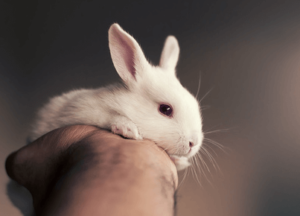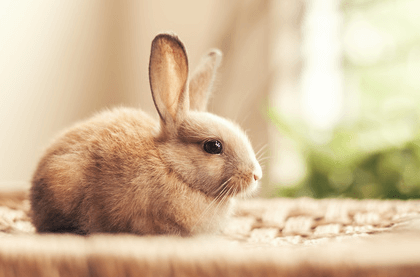 The number of domesticated rabbits in the United States is on the rise. Although still not as popular a pet as a cat or a dog, rabbits are well-loved by the families who do have them. Depending on the breed of rabbit, the domestic rabbit could live between 5-12 years.
The number of domesticated rabbits in the United States is on the rise. Although still not as popular a pet as a cat or a dog, rabbits are well-loved by the families who do have them. Depending on the breed of rabbit, the domestic rabbit could live between 5-12 years.
Especially in the spring, close to Easter time, animal lovers consider adding a rabbit to their family. Before you do, learn how to care for the little fur baby.
Here are 10 tips to give your rabbit the best care:
Domestic rabbits are best kept indoors.
Outdoors is fine for wild rabbits, but domestic rabbits need the safety and warmth the indoors provides.
Bunny-proof your home.
Rabbits like to chew. Make sure to keep your indoor rabbits away from electric cords, cleaning supplies, and house plants or flower bulbs that could be poisonous. Provide things that are appropriate to chew like cardboard or untreated wood.
Make sure the cage is big enough.
Yes, the bunny is small, but the cage needs to be the right size. The pen should be at least 4-6 times bigger than the rabbit. But bigger is better especially if the rabbit stays in the cage for long periods of time.
Just like dogs and cats need their exercise, so do rabbits.
If you keep your rabbit in a cage primarily, make sure to let them out for some exercise. They are most active at dawn and dusk.
Keep the litter box fresh.
You may want to have more than one around.
Rabbits need special food.
Their diet should be mostly hay and vegetables with fruit as treats. Vary the fruits and vegetables, although do your research as to which vegetables and fruits are safe. Do not give them human processed food. Their digestive systems are sensitive. There are also rabbit pellets on the market, but these pellets should not be the only thing the rabbit eats.
Supply fresh water in a bottle or a bowl.
A heavy bowl will prevent it from being tipped over.
Spaying and neutering can prevent reproduction.
Rabbits multiply like… rabbits! Spaying and neutering can also prevent female health problems or reduce aggression.
Groom your rabbit.
Rabbits cannot cough up fur balls, yet they do clean themselves. Brush away loose fur. Learn how to clip your rabbit’s nails.
If you have any concerns about your rabbit’s health or you notice any changes in their daily activity or behaviors, contact your veterinarian.
Taking your rabbit for regular well-checks is helpful for your rabbit’s comfort at the vet and so your vet can get to know your rabbit’s normal behaviors.
If you are in the Durham or North Churton area and need a vet for your pet rabbit, contact Dr. Jim Miller.






